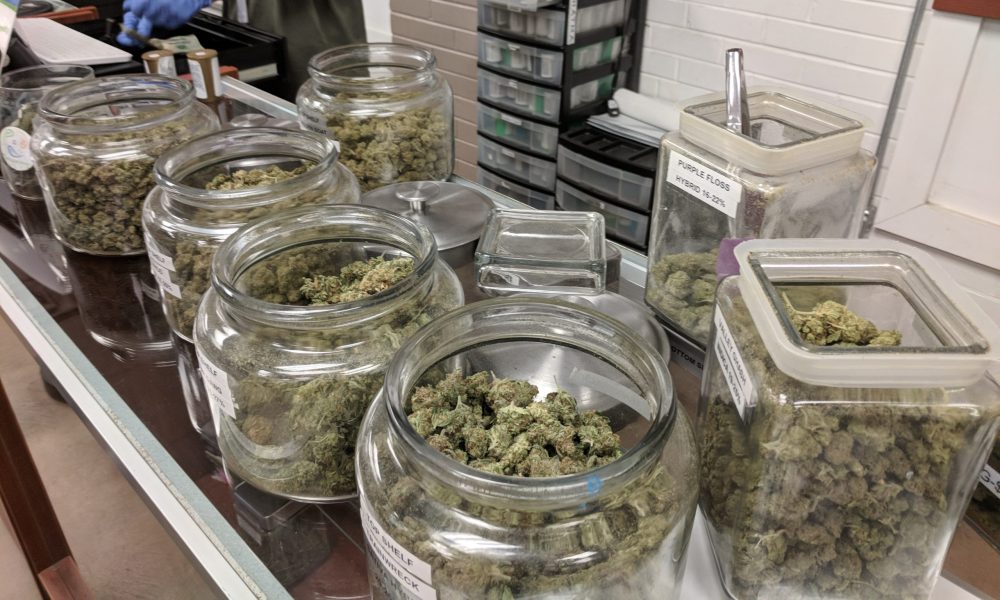Pennsylvania House lawmakers filed a companion bill to a Senate-passed measure this week that would provide banking protections and tax relief for marijuana businesses as congressional reform continues to stall.
The Senate version already cleared that chamber earlier this month, sending it to the House. But Rep. Christopher Rabb (D) and colleagues formally filed the companion bill on Wednesday after circulating a memo to build support for the policy change on the unofficial marijuana holiday 4/20 last week.
The Senate version was amended as it moved through the body before final passage. Both bills would provide state-level protections to banks and insurers that work with medical cannabis businesses in the state, but the newer House bill also contains a provision concerning tax credit eligibility for the market that was removed from the Senate measure in committee.
The language is meant to address a key challenge that cannabis companies face under federal prohibition. Currently, despite being required to pay federal taxes, businesses that work with controlled substances like marijuana are prohibited from making tax deductions that are available in other traditional industries. The restriction is due to an Internal Revenue Service code known as 280E.
A source familiar with the legislative strategy in Pennsylvania said the plan is to tackle that issue in separate, wide-ranging tax legislation, rather than through the standalone cannabis banking bill.
In any case, both the Senate-passed bill and House companion are awaiting action in the House Commerce Committee, which has not yet scheduled a hearing on either measure.
In New York, where adult-use marijuana sales are expected to launch later this year, lawmakers sent a budget proposal to the governor this month that includes provisions to let marijuana businesses take state tax deductions that are available to other industries despite an ongoing federal ban on cannabis.
—
Marijuana Moment is already tracking more than 1,000 cannabis, psychedelics and drug policy bills in state legislatures and Congress this year. Patreon supporters pledging at least $25/month get access to our interactive maps, charts and hearing calendar so they don’t miss any developments.![]()
Learn more about our marijuana bill tracker and become a supporter on Patreon to get access.
—
The current federal policy has meant that “many cannabis-related businesses are locked out of the banking system without access to financial tools and are forced to operate exclusively in cash,” Rabb wrote in his co-sponsorship memo dated 4/20. “This is a public safety risk as dispensaries are targets for robberies that put patients, employees, and communities at risk.”
“Banking challenges are not limited to just those businesses that have direct contact with the cannabis plant, but also those entities that receive payments from a cannabis firm such as real estate owners, security firms, utility providers, vendors, and employees,” he said. “As the state legal cannabis industry grows, ancillary businesses will be critical to this emerging economy.”
“The SAFE Banking Act is designed to reduce cash-motivated crimes, improve tax collections, and spur economic growth and development,” the memo concludes. “Access to the financial system for state legal cannabis businesses further ensures a safe and well-regulated market.”
The text of the Pennsylvania legislation states that a “financial institution authorized to engage in business in this Commonwealth may provide financial services to or for the benefit of a legitimate cannabis-related business and the business associates of a legitimate cannabis-related business.” The same protections would also be codified for insurers.
However, it specifies that the bill would not require banks or insurers to provide services to medical marijuana businesses.
The legislation says that state government agencies cannot “prohibit, penalize or otherwise discourage a financial institution or insurer from providing financial or insurance services to a legitimate cannabis-related business or the business associates of a legitimate cannabis-related business.”
It also says agencies cannot “recommend, incentivize or encourage a financial institution or insurer” to not provide services just because a business is associated with marijuana.
Further, state agencies could “not take adverse or corrective supervisory action on a loan made to a legitimate cannabis-related business,” the text says.
These are the types of policies that advocates and stakeholders have been pushing Congress to enact at the federal level, but it remains to be seen when that might happen.
A congressional bipartisan bill to holistically fix the problem by safeguarding all financial institutions that work with state-legal marijuana businesses has passed in the House six times in some form, but it’s stalled in the Senate under both Democratic and Republican control.
Advocates and stakeholders are pushing for the measure’s inclusion in a large-scale manufacturing bill that’s heading to bicameral conference—and key lawmakers in both chambers have signaled that they will fight to achieve that—but it’s yet to be seen if the pressure will be enough.
Banking associations representing all 50 states and one U.S. territory sent a letter to Senate leaders on Thursday, imploring them to include marijuana banking reform in the America COMPETES Act.
Rep. Earl Blumenauer (D-OR), a longstanding champion for cannabis reform who was appointed to serve as a conferee on the America COMPETES Act, sent a separate letter on the issue to House and Senate leadership this week alongside alongside SAFE Banking sponsor Rep. Ed Perlmutter (D-CO).
At a recent event hosted by ABA, Perlmutter said that he will “continue to be a real pest, and persistent in getting this done” before he leaves Congress.
Ahead of that event, the financial group released a poll that it commissioned showing that a strong majority of Americans support freeing up banks to work with marijuana businesses without facing federal penalties.
Sen. Patty Murray (D-WA), a conferee and the third-highest-ranking Senate Democrat, recently visited a credit union for an event where she reiterated her support for passing the bipartisan cannabis banking reform bill and explained how she’ll fight to get the policy change enacted sooner rather than later.
House Financial Services Committee Chairwoman Maxine Waters (D-CA), another conferee, also listed the SAFE Banking Act as a legislative priority as negotiations are set to begin.
Part of the urgency behind advancing this reform is a recent surge in crime targeting cash-intensive marijuana businesses in legal states.
With burglaries and robberies on the rise at licensed cannabis retailers, Washington Gov. Jay Inslee (D) and other officials have convened a meeting with marijuana stakeholders and financial institutions to “discuss cash-less options for store operations,” the state Liquor and Cannabis Board (LCB) said in a notice last week.
Inslee, State Treasurer Mike Pellicciotti and others will separately be sending a letter to Congress to reiterate their call for a federal fix to the state-federal policy conflict on cannabis banking issues, LCB said.
Washington State officials also recently held a virtual roundtable to address the spate of deadly robberies targeting marijuana retailers, with regulators reiterating their call for a federal policy change and discussing steps the state can take on its own while Congress fails to act.
The reluctance from the Senate to pass the SAFE Banking Act prior to enacting comprehensive legalization was also the subject of a letter from Perlmutter that was sent to Senate leadership last week.
Adding pressure to pass the marijuana banking bill as part of America COMPETES is the fact that Senate Majority Leader Chuck Schumer (D-NY) recently said that the timeline for the introduction of his legalization bill has been pushed back, despite saying previously that it would be formally filed this month.
As Congress continues to stall on marijuana banking reform, officials and lawmakers in states like Pennsylvania and Washington have been taking steps on their own to resolve the issue, especially in light of the targeted crime surge.
Pellicciotti, Washington State’s treasurer, has also been especially vocal about the need for congressional reform, and he wrote in a recent letter to his colleagues in other states that it’s “just not safe to have this financial volume in cash.”
He made similar remarks at a recent conference of the National Association of State Treasurers (NAST). And Colorado Treasurer Dave Young echoed that sentiment in a recent interview with Marijuana Moment.
Perlmutter, for his part, has even made a point to talk about enacting the reform legislation during committee hearings on ostensibly unrelated or wider-ranging legislation, like at a recent House Rules Committee hearing.
Despite recently saying that he’s “confident” that the Senate will take up his bill this session, the congressman recognized that while he’s supportive of revisions related to criminal justice reform, taxation, research and other issues, he knows that “as we expand this thing, then we start losing votes, particularly Republican votes and we got enough votes in the Senate to do it” as is.
Meanwhile, the number of banks that report working with marijuana businesses ticked up again near the end of 2021, according to recently released federal data.
It’s not clear if the increase is related to congressional moves to pass a bipartisan cannabis banking reform bill, but the figures from the Financial Crimes Enforcement Network (FinCEN) signal that financial institutions continue to feel more comfortable servicing businesses in state-legal markets.
Some Republicans are scratching their heads about how Democrats have so far failed to pass the modest banking reform with majorities in both chambers and control of the White House, too. For example, Rep. Rand Paul (R-KY) criticized his Democratic colleagues over the issue in December.
Medical Disclaimer:
The information provided in these blog posts is intended for general informational and educational purposes only. It is not a substitute for professional medical advice, diagnosis, or treatment. Always seek the advice of your physician or other qualified healthcare provider with any questions you may have regarding a medical condition. The use of any information provided in these blog posts is solely at your own risk. The authors and the website do not recommend or endorse any specific products, treatments, or procedures mentioned. Reliance on any information in these blog posts is solely at your own discretion.






